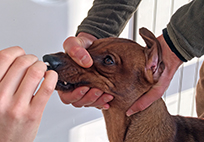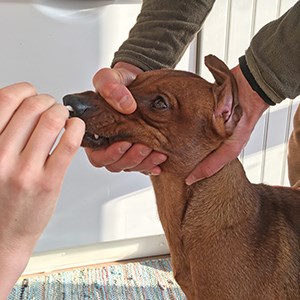The global lock downs that are affecting us all is due to the novel coronavirus (SARS-CoV2) which is causing the disease covid-19. SARS-CoV2 is one of seven species of coronavirus that cause disease in humans, but there are many more species of coronaviruses that can be found in animals, including dogs, cats, horses and cattle.
Currently, dogs are known to be infected by two different types of coronaviruses, one that causes respiratory problems and one that causes diarrhea. A research team from the Swedish University of Agricultural Sciences (SLU), Uppsala University and the National Veterinary Institute (SVA) has published the first study that shows that the virus causing respiratory disease, canine respiratory coronavirus occurs in dogs in Sweden. There are no reports that people could get this virus and presence in Sweden should not be seen as a public health risk.
Canine respiratory coronavirus is one of several viruses and bacteria that can cause kennel cough. Kennel cough mainly affects dogs that meet in larger groups, and so is often found in dogs in kennels, rehoming centres, and even those that attend dog shows. Dogs that have this disease usually have only mild symptoms such as a dry, choppy cough, but in some cases dogs may have severe symptoms such as pneumonia.
To understand how common this virus is, the researchers of this study tested samples from 88 dogs in Sweden, from Malmö in the south to Härnösand in the north, which were affected by kennel cough during the years 2013–2015. Overall, 13 of these dogs were positive for the canine respiratory coronavirus.
The viruses were found to be genetically very similar, even though the samples were taken over three years and in different parts of the country. The genetic analysis indicates that the canine respiratory coronavirus came to Sweden around 2010. How it has come here, the researchers currently cannot answer but they can see that it seems that it was introduced once, and that the virus that came then spread across the country.
The Swedish respiratory canine coronavirus is most closely related to coronavirus from a dog that was tested in Italy in 2005. It seems that the coronaviruses that circulate in dogs in Europe originally came from Asia, although there is no data to say this safely.
Coronaviruses have the ability to recombine, that is, to mix and match with other coronaviruses, thus creating new coronaviruses that can infect new host animals. This mechanism was probably important in the emergence of SARS-CoV2 and may have played a role in the emergence of this virus too. Canine respiratory coronavirus is most closely related to bovine coronavirus, a virus that causes disease in cattle including calf diarrhea, respiratory tract symptoms in young animals and winter dysentery in adult cows. Genetic analysis showed that in some canine respiratory coronaviruses that are deposited in a publicly available database, GenBank, there are some genes that are very similar to genes found in bovine coronavirus. Therefore, it is possible that the canine respiratory coronavirus originated in this way.
"The conclusion we can draw from our study is that the respiratory coronavirus that is now circulating in dogs in Sweden has not arisen through a transfer from cattle in Sweden", says Maja Malmberg from SLU, who has led the work.
There is no vaccine yet for the dog's respiratory coronavirus. In order to develop a vaccine against canine respiratory coronavirus, it is important to know how the virus looks and how much it has changed over time, which has been studied in detail in this study. In particular, the researchers have looked more closely at the so-called spike protein that the virus uses to get into the cells. Because the spike protein is on the outside of the virus, it is "visible" to the immune system and vaccines are usually developed against such visible parts of the virus. In the study, the researchers could see that the virus in the Swedish dog population has not changed much at all over time and that there is very little variation in the spike protein. This increases the chances of developing an effective vaccine.
"Currently, there are vaccines against kennel cough but these only provide protection against two of the infectious agents that can cause kennel cough, the dog's parainfluenza virus and the bacterium Bordetella bronchiseptica. Hopefully in the future there will be vaccines that can also protect against the dog's respiratory coronavirus", says co-author Jonas Johansson Wensman.
Contact persons
Maja Malmberg, Researcher
Department of Biomedical Sciences and Veterinary Public Health, Section of Virology
Swedish University of Agricultural Sciences
maja.malmberg@slu.se, +46 (0)18-67 27 77
https://www.slu.se/en/ew-cv/maja-malmberg/
Jonas Johansson Wensman, Researcher
Department of Clinical Sciences; Ruminant Medicine Unit
Swedish University of Agricultural Sciences
jonas.wensman@slu.se, +46 (0)18 67 14 46
https://www.slu.se/en/ew-cv/jonas-johansson-wensman/
The scientific article
Evolutionary genetics of canine respiratory coronavirus and recent introduction into Swedish dogs. Michelle Wille, Jonas Johansson Wensman, Simon Larsson, Renaud van Damme, Anna-Karin Theelke, Juliette Hayer & Maja Malmberg. Infection, Genetics and Evolution, 2020. https://doi.org/10.1016/j.meegid.2020.104290
Press images
(May be published without charge in articles about this press release, please acknowledge the photographer).

A dog being swabbed for a canine respiratory coronavirus test. Photo: Maja Malmberg

Maja Malmberg. Photo: Andrzej Tarski


